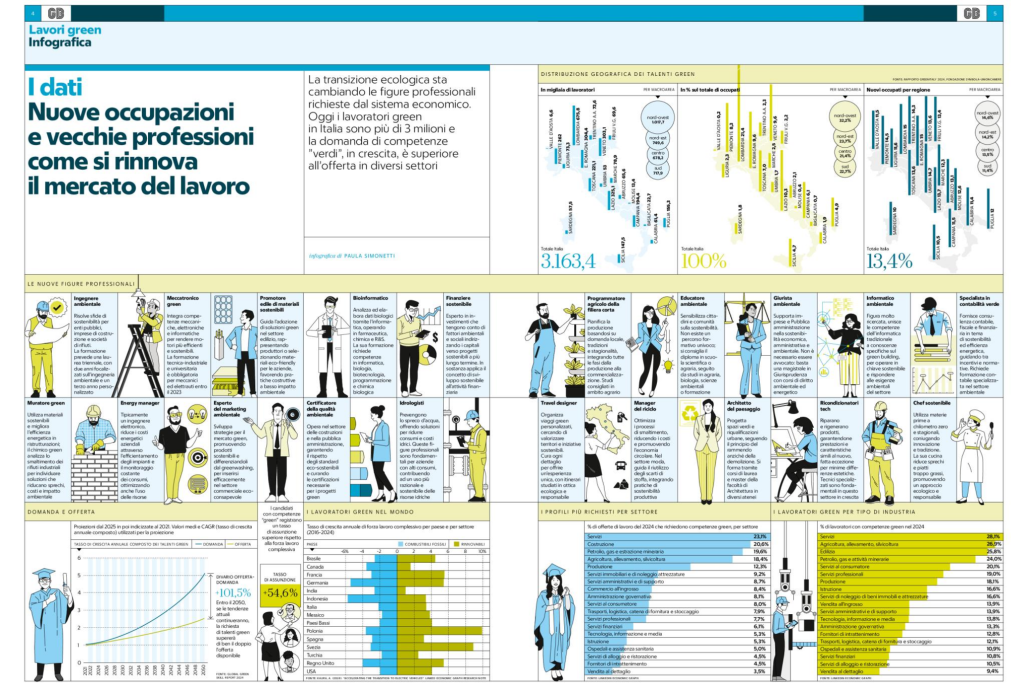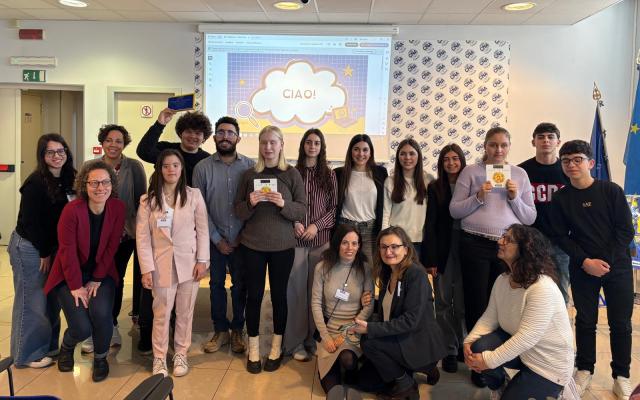The NEET challenge in Europe
In Europe, the challenge of NEET (young people Neither in Employment, Education, or Training) remains a significant issue. In Italy alone, 16.1% of young people aged 15-29 fall into this category, far above the European average of 11.2%. This number is even higher for those aged 25-29 (22.7%), highlighting the difficulties faced by young adults transitioning into the labor market [Source: Istat, Livelli di istruzione e ritorini occupazionali, anno 2023]. Furthermore, disparities between regions exacerbate the issue: while the southern regions of Italy have a higher percentage of NEETs, surveys show that these young people demonstrate strong willingness to re-enter the workforce if given opportunities.
A common challenge across Europe is the lack of structured pathways for these young people to acquire skills that match evolving labour market needs.
The growing demand for green skills
The demand for green talent has surged worldwide, with an average annual increase of 5.9% between 2021 and 2024. Countries such as the UK (+13%), Ireland (+12.4%), and Switzerland (+11.5%) have seen the highest demand for green skills, while others like Portugal and Costa Rica have experienced the fastest growth rates.
However, despite this growing demand, the supply of green talent is not keeping pace. While green talent supply has increased by 5.6% globally from 2023 to 2024, demand has outstripped supply in many countries, creating significant skill gaps. This trend is expected to widen unless decisive action is taken, with projections indicating a global talent gap of 18.7% by 2030 and over 100% by 2050. [Source: Global Green Skills Report 2024, LinkedIn]
Unlocking opportunities: engaging NEET Youth in the green economy
Given the rapid transition toward a sustainable economy, integrating NEET youth into the green job market presents a dual opportunity: addressing unemployment while filling the green skills gap. Many green jobs do not require advanced degrees but instead demand vocational training and specialized skills. This makes them particularly suited for NEET youth, who often struggle with long-term unemployment due to a lack of market-relevant competencies.
Programs focusing on green skill development could provide NEET youth with clear pathways to employment. For instance, roles in renewable energy, waste management, sustainable construction, and environmental auditing are rapidly growing yet suffer from a shortage of qualified workers. Upskilling programs could target these specific industries, ensuring that the youth are prepared for jobs that align with Europe's green transition goals.
The role of initiatives like "Le competenze per ripartire" and "PRODIGY"
Fondazione Mondo Digitale is actively working to bridge this gap through initiatives like "Le competenze per ripartire" and "PRODIGY."
- Le competenze per ripartire: this project, in collaboration with LinkedIn, focuses on equipping NEET youth with digital skills and professional networking tools. The initiative offers training sessions on LinkedIn profile optimization, job search strategies, and networking to enhance employability.
- PRODIGY: this program uniquely combines the needs of NEET youth and the growing green economy. It provides participants with essential green skills, linking them to emerging job opportunities in sustainable industries. Through mentorship and hands-on learning experiences, PRODIGY aims to create a workforce that is not only digitally competent but also ready to contribute to Europe’s green transition.
Sustainability: not just Green skills
As Mirta Michilli, Director General of Fondazione Mondo Digitale, highlights in her reflections on GreenComp, the European framework for sustainability competencies, the complexity of our times requires an integrated approach to education and skill development. Thus, the use of term “green”, often chosen for its phonetics and simplicity, must not mislead us into thinking these skills pertain solely to environmental sustainability.
Developed by the European Commission’s Joint Research Centre (JRC), GreenComp itself underscores the importance of holistic sustainability—linking environmental awareness with digital transformation and personal well-being. Ways of thinking, planning, and acting with empathy, responsibility, and care for the planet and public health can also be considered as sustainability competencies.
By fostering agency and problem-solving skills, GreenComp aligns closely with the mission of initiatives like "Le competenze per ripartire" and "PRODIGY," which empower young people to transition into the workforce with the skills needed for a sustainable future.


By Alberta Testa, social media manager





